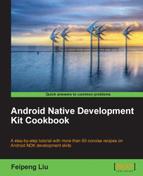This recipe will discuss how to port an existing library as a shared
library with the Android NDK build system. We will use the open source libbmp library as an example.
Readers are recommended to read the Building an Android NDK application at the command line recipe in Chapter 3, Build and Debug NDK Applications, before going through this one.
The following steps describe how to create our sample Android project that demonstrates porting the libbmp library as a shared library:
- Create an Android application named
PortingSharedwith native support. Set the package name ascookbook.chapter8.portingshared. Please refer to the Loading native libraries and registering native methods recipe of Chapter 2, Java Native Interface, if you want more detailed instructions. - Add a Java file
MainActivity.javaunder thecookbook.chapter8.portingsharedpackage. This Java file simply loads the shared library.bmpandPortingShared, and calls the native methodnaCreateABmp. - Download the
libbmplibrary from http://code.google.com/p/libbmp/downloads/list, and extract the archive file. Create a folder namedlibbmpunder thejnifolder, and copy thesrc/bmpfile.candsrc/bmpfile.hfiles from the extracted folder to thelibbmpfolder. - Remove the following code from
bmpfile.hif you are using NDK r8 and below:#ifndef uint8_t typedef unsigned char uint8_t; #endif #ifndef uint16_t typedef unsigned short uint16_t; #endif #ifndef uint32_t typedef unsigned int uint32_t; #endif
- Then, add the following line of code:
#include <stdint.h>
Note
The code changes for
bmpfile.hare only necessary for Android NDK r8 and below. Compiling the library will return an error"error: redefinition of typedef 'uint8_t'". This is a bug in the NDK build system as theuint8_tdefinition is enclosed by the#ifndefpreprocessor. It has been fixed since NDK r8b, and we don't need to change the code if we're using r8b and above. - Create an
Android.mkfile under thelibbmpfolder to compilelibbmpas a shared librarylibbmp.so. The content of thisAndroid.mkfile is as follows:LOCAL_PATH := $(call my-dir) include $(CLEAR_VARS) LOCAL_MODULE := libbmp LOCAL_SRC_FILES := bmpfile.c include $(BUILD_SHARED_LIBRARY)
- Create another folder named
libbmptestunder thejnifolder. Add themylog.handPortingShared.cfiles under it.PortingShared.cimplements the native methodnaCreateABmp, which uses functions defined in thelibbmplibrary to create a bitmap image and save it to/sdcard/test_shared.bmp. You will need to change directory if the/sdcarddirectory is not available on your devices:void naCreateABmp(JNIEnv* env, jclass clazz, jint width, jint height, jint depth) { bmpfile_t *bmp; int i, j; rgb_pixel_t pixel = {128, 64, 0, 0}; for (i = 10, j = 10; j < height; ++i, ++j) { bmp_set_pixel(bmp, i, j, pixel); pixel.red++; pixel.green++; pixel.blue++; bmp_set_pixel(bmp, i + 1, j, pixel); bmp_set_pixel(bmp, i, j + 1, pixel); } bmp_save(bmp, "/sdcard/test_shared.bmp"); bmp_destroy(bmp); } - Create another
Android.mkfile under thelibbmptestfolder to compile thePortingShared.cfile as another shared librarylibPortingShared.so. The content of thisAndroid.mkfile is as follows:LOCAL_PATH := $(call my-dir) include $(CLEAR_VARS) LOCAL_MODULE := PortingShared LOCAL_C_INCLUDES := $(LOCAL_PATH)/../libbmp/ LOCAL_SRC_FILES := PortingShared.c LOCAL_SHARED_LIBRARIES := libbmp LOCAL_LDLIBS := -llog include $(BUILD_SHARED_LIBRARY)
- Create an
Android.mkfile under thejnifolder with the following content:LOCAL_PATH := $(call my-dir) include $(call all-subdir-makefiles)
- Add the
WRITE_EXTERNAL_STORAGEpermission to theAndroidManifest.xmlfile as follows:<uses-permission android:name="android.permission.WRITE_EXTERNAL_STORAGE"/>
- Build and run the Android project. A bitmap file
test_shared.bmpshould be created at thesdcardfolder of the Android device. We can use the following command to get the file:$ adb pull /sdcard/test_shared.bmp .
The following is a
.bmpfile:
The sample project demonstrates how to port the libbmp code as a shared library and use it in the native code PortingShared.c.
Shared library: A shared library can be shared by multiple executables and libraries. The Android native code is usually compiled as shared libraries and loaded by the Java code. In fact, the Android build system only packages shared libraries into the application's apk file. Therefore, we must provide at least one shared library to
contain our native code.
Our sample project builds two shared libraries, namely libbmp.so and libPortingShared.so. We can find these libraries under the libs folder of the project. libPortingShared.so depends on libbmp.so, since PortingShared.c calls functions defined in the libbmp library.
In our Java file, we need to load libbmp.so before libPortingShared.so, as follows:
static {
System.loadLibrary("bmp");
System.loadLibrary("PortingShared");
}Understand the Android.mk files: Android NDK provides an easy-to-use build system, which frees us from writing makefiles. However, we still need to provide some basic inputs to the system through Android.mk and Application.mk. We only discuss Android.mk in this recipe.
The Android.mk file is a GNU makefile fragment that describes the sources to the Android build system. The sources are grouped into modules. Each module is a static or shared library. The Android NDK provides a few predefined variables and macros. Here, we will briefly describe the ones used in this recipe. We will introduce more predefined variables and macros in subsequent recipes and you can also refer to Android NDK docs/ANDROID-MK.html for more information.
CLEAR_VARS: This variable points to a script, which undefines nearly all module description variables exceptLOCAL_PATH. We must include it before every new module, as follows:include $(CLEAR_VARS)
BUILD_SHARED_LIBRARY: This variable points to a build script, which determines how to build a shared library from the sources listed, based on the module description. We must haveLOCAL_MODULEandLOCAL_SRC_FILESdefined when including this variable, as follows:include $(BUILD_SHARED_LIBRARY)
Including it will generate a shared library
lib$(LOCAL_MODULE).so.my-dir: This must be evaluated by using$(call <macro>). Themy-dirmacro returns the path of the last included makefile, which is usually the directory containing the currentAndroid.mkfile. It is typically used to define theLOCAL_PATH, as follows:LOCAL_PATH := $(call my-dir)
all-subdir-makefiles: This macro returns a list ofAndroid.mkfiles located in all subdirectories of the currentmy-dirpath. In our example, we used this macro in theAndroid.mkfile under thejni, as follows:include $(call all-subdir-makefiles)
This will include the two
Android.mkfiles underlibbmpandlibbmptest.LOCAL_PATH: This is a module description variable, which is used to locate the path to the sources. It is usually used with themy-dirmacro, as follows:LOCAL_PATH := $(call my-dir)
LOCAL_MODULE: This is a module description variable, which defines the name of our module. Note that it must be unique among all module names and must not contain any space.LOCAL_SRC_FILES: This is a module description variable, which lists out the sources used to build the module. Note that the sources should be relative toLOCAL_PATH.LOCAL_C_INCLUDES: This is an optional module description variable, which provides a list of the paths that will be appended to the include search path at compilation. The paths should be relative to the NDK root directory. InAndroid.mk, under thelibbmptestfolder of our sample project, we used this variable as follows:LOCAL_C_INCLUDES := $(LOCAL_PATH)/../libbmp/
LOCAL_SHARED_LIBRARIES: This is an optional module description variable, which provides a list of the shared libraries the current module depends on. InAndroid.mk, under thelibbmptestfolder of our sample project, we used this variable to include thelibbmp.soshared library:LOCAL_SHARED_LIBRARIES := libbmp
LOCAL_LDLIBS: This is an optional module description variable, which provides a list of linker flags. It is useful to pass the system libraries with the-lprefix. In our sample project, we used it to link the system log library:LOCAL_LDLIBS := -llog
With the preceding description, it is now fairly easy to understand the three Android.mk files used in our sample project. Android.mk under jni simply includes another two Android.mk files. Android.mk under the libbmp folder compiles the libbmp sources as a shared library libbmp.so, and Android.mk under the libbmptest folder compiles PortingShared.c as the libPortingShared.so shared library, which depends upon the libbmp.so library.
It is possible to use a shared library in the native code, as we have demonstrated in the Programming with dynamic linker library at Android NDK recipe in Chapter 6, Other Android NDK API.
